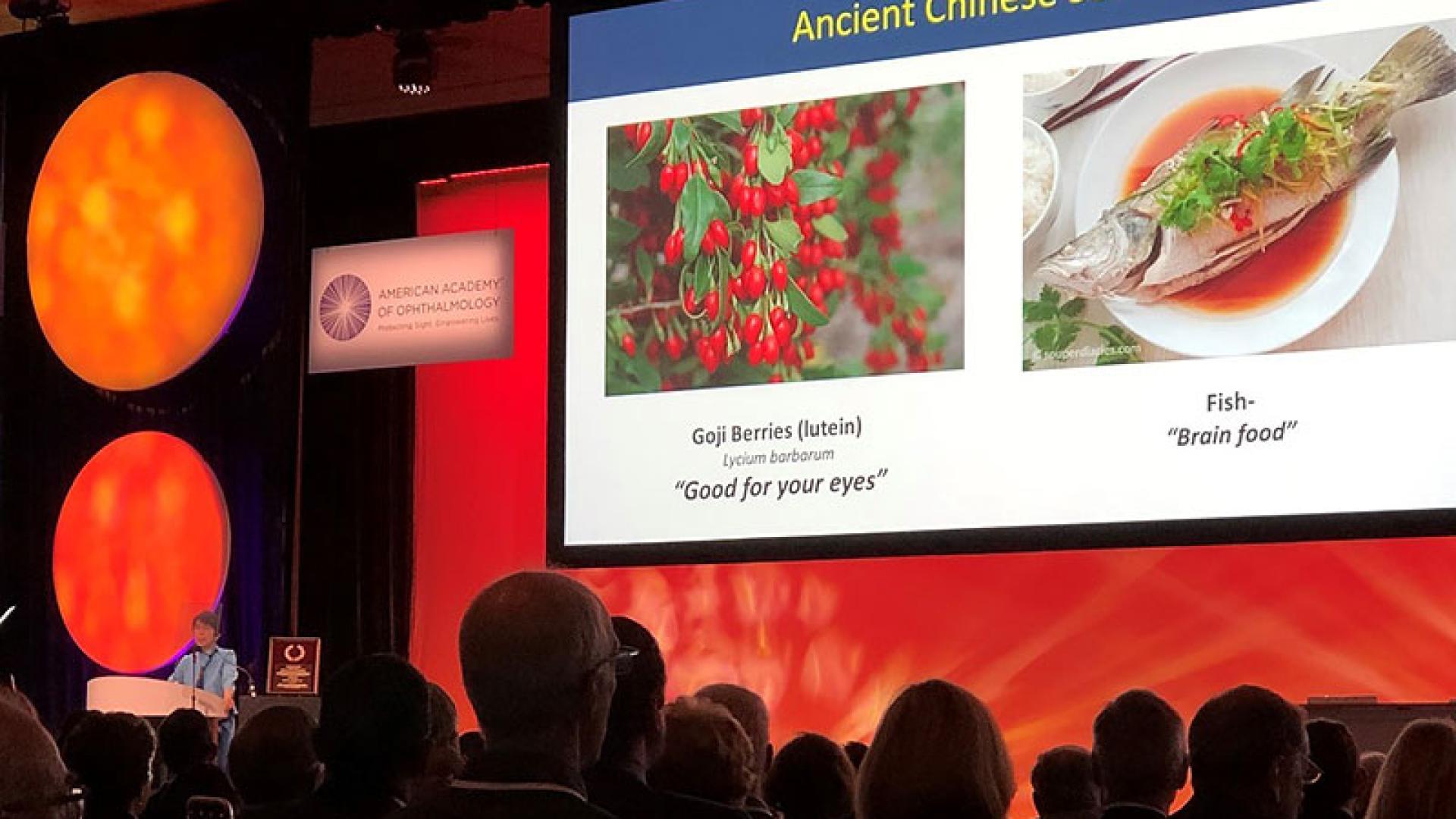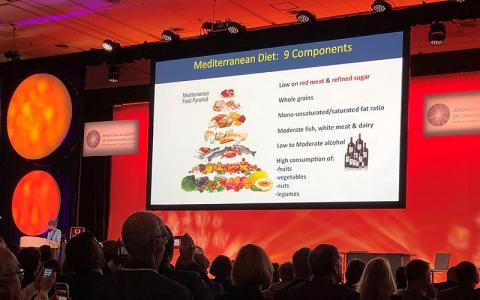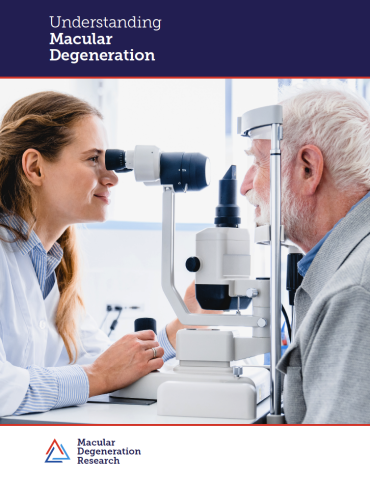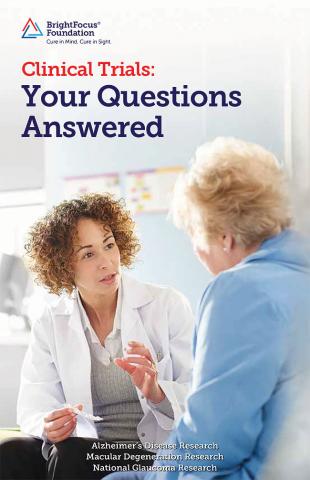Your Eyes, Your Diet, and Nutritional Supplements for AMD: An Interview with NIH Vision Expert
Written By: BrightFocus Editorial Staff



Written By: BrightFocus Editorial Staff

One of the world’s top vision experts, Emily Chew, MD, essentially wrote the book on nutritional supplements for age-related macular degeneration (AMD). As deputy director of Epidemiology and Clinical Applications at the National Eye Institute (NEI), she is at the center of vision research within the U.S. National Institutes of Health. Earlier in her career, Dr. Chew led the NEI’s Age-Related Eye Disease Study (AREDS) and its sequel, AREDS2, two major clinical trials that supplied evidence for a formula of vitamin supplements that goes by the same name. When used in intermediate-stage AMD, AREDS2 vitamins reduce the risk of developing vision-threatening, advanced AMD, and are recommended by many doctors.
BrightFocus recently featured Dr. Chew as our guest on the BrightFocus Chat, a free monthly teleforum on vision issues. What follows is an excerpt from the conversation, edited for brevity, between Dr. Chew and BrightFocus host Michael Buckley
BRIGHTFOCUS: Tell us a little about what you do at the NEI?
DR. CHEW: I’ve been at the NEI for almost three decades, and my primary goal is to help patients. I’m a clinician at heart, and I see patients [enrolled in NEI clinical trials] one or two days a week. The rest of the time I spend looking at research projects, especially clinical trials. We also mentor medical students and physicians who are here to learn more about the eye.

BRIGHTFOCUS: What made you decide to get involved in vision health research?
DR. CHEW: I had in my mind that I’d become a pediatrician, and [as a young medical student] I met Dr. Brenda Gallie, a top researcher in an eye tumor that occurs in children. She impressed upon me how important it is to do research [so] that we would be able to [help] many people, rather than just one at a time. I also realized that ophthalmology is a fantastic field. The research is abundant, and there are very bright people in it.
BRIGHTFOCUS: Is vision loss an inevitable part of aging?
DR. CHEW: Aging is associated with some changes in the eye, but much of it is correctable. We lose the ability to read up close, so we have to wear reading glasses; we adapt. Almost everybody, if they live long enough, will develop some form of cataract – but cataract surgery is common, and a lot of people [have] great vision afterwards. And, of course, you may have to change your glasses. Those are all very correctable types of vision loss.
The ones that are more difficult are chronic diseases, such as glaucoma, diabetic eye disease, and macular degeneration. By age 80, something like 30 percent of people, especially women, may have AMD. These chronic conditions are somewhat preventable, and the number one thing would be getting a good eye exam.
BRIGHTFOCUS: How do diet and exercise influence age-related vision diseases, such as AMD?
DR. CHEW: AMD can be affected by your lifestyle quite dramatically. People who smoke always have an increased risk of macular degeneration, and it increases like a dose response: the more you smoke, the more likely you’re going to get macular degeneration.

Diet is [another] aspect of this. People who eat a lot of green, leafy vegetables that contain the vitamins lutein and zeaxanthin have a lower risk of having macular degeneration; and people who eat fish also have a lower risk. This was borne out by a study looking at the dietary habits of almost 8,000 people and seeing what happens five to 10 years later. It seemed there was a protective effect in people who ate a Mediterranean diet (full of vegetables, legumes, grains, olive oil, and low in red meat but high in fish and chicken). People who ate a good Mediterranean diet had an almost 25-30% reduced risk of macular degeneration; specifically, the green, leafy vegetables and the fish really were very important.
BRIGHTFOCUS: If someone has not eaten a vision-healthy diet up to now, is it too late to start?
DR. CHEW: No, it’s never too late. Our studies looked at patients who already had early forms of disease, and if they ate a good diet over the next five to 10 years, there were reductions [in risk]. So, it’s never too late. You can start now.
BRIGHTFOCUS: What led to recommending the AREDS formula?
DR. CHEW: AREDS, which stands for the Age-Related Eye Disease Study, was started in 1992 to look at the natural history and the risk factors associated with cataracts and macular degeneration. There were hints that diet might be important. So, we put together a formulation [of vitamin supplements] that was being tested for other diseases.
We thought this would be important for cataracts, but much to our surprise, at the end of the study (which averaged 6.5 years), we found out that the patients who benefitted most were those with intermediate AMD. In that group, there was a 25% reduction in the risk of progressing to the more [advanced] vision- threatening types of AMD [ie, wet AMD or advanced form of dry AMD known as geographic atrophy].

So, that’s where the AREDS formula came from. Twenty-five percent is not a cure; it’s a modest effect, but one that’s very important [because] AMD is a common condition. If you have heart disease, even a 10% reduction would be very significant. Here a 25% percent reduction can reduce the number of people going to late AMD and requiring injections.
That was in 2001. AREDS became the standard therapy until we did another 5-year study with about 4,000 participants, which was AREDS 2. That new formulation— which has lutein/zeaxanthin added [and beta-carotene removed due to cancer risk in smokers]—is better.
BRIGHTFOCUS: Can someone take AREDS 2 vitamins proactively to avoid getting AMD?
DR. CHEW: No. We really don’t give it to people who don’t have macular degeneration. It’s only for when you have an intermediate form, which is signified by having large drusen. Before that, it really doesn’t make any difference. It is important to get an eye exam and have a conversation with your doctor before you start.
BRIGHTFOCUS: Is it possible to get AREDS2 vitamins through food rather than through supplements?
DR. CHEW: It’s important to eat well, but the supplements are required. These are really large doses, very difficult to obtain through the diet. To get that amount of vitamin C, you’d have to eat at least more than a dozen oranges a day, which nobody does. The vitamin E would be like a whole room full of wheat germ.
BRIGHTFOCUS: How does one go about finding the AREDS2 supplements, and are there ways to bring down the costs? A lot of people may find the supplement aisle at a supermarket or pharmacy to be overwhelming.
DR. CHEW: I find it confusing myself when I walk down the aisle. I always tell people to look for the large, bold AREDS 2 right on the cover, not in small print. There are many knockoffs.
As far as cost is concerned, a lot of “big box” places carry big brands, so you can look for that. Some of the pharma companies give out coupons. If you served the government and belong to the Veterans Administration [health system], the VA provides AREDS2 vitamins for free.
BRIGHTFOCUS: Recently you studied whether calcium increases the risk of macular degeneration. Can you tell us about that?
DR. CHEW: Many people are on calcium because of bone health, and we [did] this study because other studies suggested that maybe calcium might be harmful. We found that in people who had either taken supplements or have a higher intake in their diet, there was a less risk of having late macular degeneration, especially the wet form.
Does that mean we should give calcium to everybody? The answer is “no.” We don’t have recommendations. What this study does is to allay anyone’s fears that taking calcium for osteoporosis would make their macular degeneration worse. We don’t think that’s the case.

BRIGHTFOCUS:Why are clinical trials important—and what are some things people should know?
DR. CHEW: Clinical trials are essential for us to understand whether treatments work. Why would you want to be in a study? People benefit because they’re being watched very carefully. In some studies they may be getting [treated] for free. And they’re often the first to know [whether a treatment] might be promising.
Sometimes [it helps] to talk to a doctor to learn what the risks are compared to the benefits. If the risks outweigh, you might be a little wary. But most clinical trials have institutional review boards which are on the side of the patient.
It’s the power of the study that really allows us to decide whether a treatment is good or not. Without our patients, we cannot do that. So, I’m grateful to the thousands of patients who dedicated their time to AREDS and AREDS 2 and other studies that we do.
BRIGHTFOCUS: What are the most important things people should do to protect their vision health?
DR. CHEW: A regular eye exam is important. If you can treat things earlier on, rather than waiting until something bad happens, it’s much better. Eating a good diet and having that eye exam would help.
As you get older, it’s essential to keep yourself in good eye health [for] quality of life. And 2020 is coming up, so it’s a very auspicious year [for vision health]!
[ Read a short article summarizing Dr. Chew’s advice. ]
* Download Our Publications:
BrightFocus Foundation is a premier global nonprofit funder of research to defeat Alzheimer’s, macular degeneration, and glaucoma. Through its flagship research programs — Alzheimer’s Disease Research, Macular Degeneration Research, and National Glaucoma Research— the Foundation has awarded nearly $300 million in groundbreaking research funding over the past 51 years and shares the latest research findings, expert information, and resources to empower the millions impacted by these devastating diseases. Learn more at brightfocus.org.
Disclaimer: The information provided here is a public service of BrightFocus Foundation and is not intended to constitute medical advice. Please consult your physician for personalized medical, dietary, and/or exercise advice. Any medications or supplements should only be taken under medical supervision. BrightFocus Foundation does not endorse any medical products or therapies.
